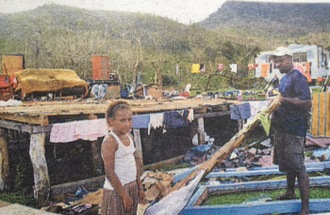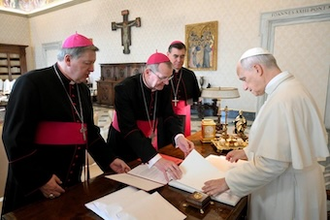Eyewitness reports from Fiji in wake of Tropical Cyclone Winston

Only the floor of their house remains
Columban Fathers John McEvoy and Donal McIlraith were near the epicentre of Tropical Cyclone Winston as it battered the fragile Fiji islands last weekend.
Father John McEvoy writes:
Never before did I find it so hard to write a few lines about a situation.... The nation is numb, shell-shocked and overwhelmed, so are we. The situation has emotionally affected us all and like the nation we are somewhat paralysed, crying within and unable to get up and move into action.
The Holy Year of Mercy: The Fiji Group of Islands was visited last Saturday and Sunday 20th and 21st Feb. 2016 by Tropical Cyclone Winston - but it had no mercy on us whatsoever. It wreaked havoc throughout this little island nation which is comprised of about 300 islands, of which a hundred are inhabited.
There are two main islands in the group: Viti Levu and Vanua Levu. Winston came in from the East and tracked westwards between the two main islands knocking everything in its path - with average winds of 250 km per hour gusting to 325 km per hour. It was a category five cyclone - never before experienced in Fiji and the strongest recorded winds in the Southern Hemisphere. Thus all of the islands in Lomaiviti (middle Fiji) received the brunt of Wilston's fury, destroying homes and livelihoods by the thousands and cutting many Fijians off from utilities, telecommunications and medical services.
The Cyclone had passed us by about ten days previously but did a U-turn gathering speed and momentum all the time. So basically we had good warning that a serious cyclone was on its way - but lots of people left it to the last moment to secure their houses and property to be ready to evacuate. The Fijian Government acted promptly on Saturday morning by imposing a curfew in the major cities and towns from Saturday evening to Monday morning - this surely would have saved many people from been electrocuted as electric wires and poles were strewn all over the place in towns and villages.
The only Columban parish to be badly hit was Ba where Fr Nilton Iman in Parish Priest, assisted by Fr John Lee. The three schools in the parish has been extensively damaged. St Teresa School, Ba has lost about four or five classrooms including the IT room and its computers. The presbytery too lost most of its windows and louvers. The Parish hall was used as an evacuation centre, sheltered a number of families. Trees were uprooted all around the compound and one of them came down and crashed onto the roof of the Lay Missionary house which is also in the church compound. The children's dormitory and a few classrooms in Navala Catholic School were blown away. The children from the dormitory are now billeted in the Church there. The new two story classroom in Votua (built with Japanese aid recently) also lost its roof. This school building is used as an evacuation centre for the villagers of Votua - in times like this and in times of flooding, which often occurs in Votua as the Ba River often burst its banks. St Columban's Church Votua was fairly badly damaged.
The town itself is wrecked. About six-eight huge big secondary schools of all faiths had their roofs blown off. Such a sad sight to see all these fine buildings with just their walls remaining. The main sports stadium in the town 'Govind Park' also fell prey to the fury of Winston. The experience must have been horrific and frightening for Frs. Nilton and John as it would be their first experience of a tropical cyclone. To make things worse - all communications with Ba and everywhere else in Fiji was cut. We couldn't contact them or they us - same with so many other people living in Suva - trying to contact their relatives and friends in the islands - even as I write there are areas and people that hasn't yet been contacted. It is so frustrating in this day and age of communications - when this happens. Of course the reason is that all electric power lines were crippled and phone masks were blown down too.
Suva was not as badly hit as the Western Division or the Islands in Lomaiviti Group, however, the power was off for several days - only came back here in Raiwaqa yesterday 24th and there are still areas in the capital without power. There are five squatter settlements in the parish of St Pius X, Raiwaqa. Most of these people were evacuated to nearby centres - school buildings and church halls etc. I did a quick trip around some of them on Sunday morning in spite of the curfew being in place. Most of their little houses are in low lying places and thus sheltered escaped the wrath of Winston. The owners were in fact returning to their settlements early Sunday morning. One of the settlements, Nanuku, was flooded as the area is tidal - they moved into the nearby Methodist Church. They were visited by Fr Donal McIlraith and our Columban students on Sunday morning and provided them with enough provisions for the day. Fr Donal repeated this for the last few mornings - they have now moved back to their houses 'shacks' The Society of St Vincent de Paul in the parish will now supply them with cloths and other necessities.
The Church and Presbytery here had roof and ridge tiles and flashings blown off. Apart from that and the water blown into both premises by the winds - there was no more structural damage to the compound. Labasa Parish where Paul Tierney is Parish Priest assisted by JJ Ryan would seem to have been spared. But to their south in Bua and north and north west on the Island of Taveuni - it was the same story of devastation as suffered in the Lomaiviti Group - with whole villages destroyed. Huge damage was done to the parishes and the villages of Solevu, Savusavu, Levuka, Taveuni, Rabi, Natovi, Rakiraki, and of course the Catholic Schools in these parishes suffered extensively too. Their story has yet to be told.
In summary: Winston has claimed 42 lives thus far. A total of 19,294 people sought refuge in 253 evacuation centres across the Western Division. Some 8,867 people were situated in 83 evacuation centres in Ra and Rakiraki.
The international community are responding quickly and generously with promise of money, food, aid of every kind, New Zealand and Australia were the first to commit - sending in survival kits, the use of planes and helicopters. Japan and India has come aboard - so now too is China, Britain and the US. Some are channelling aid and money via the Red Cross. Of course the Churches too are all involved. They are on the ground with their suffering people.
Prime Minister Voreqe Bainimarama has called on all Government agencies and personnel to prioritise the deployment of personnel to these communities to provide relief support and assistance. He has advised all agencies in charge of relief efforts to ensure that all possible options are looked at to ensure that an immediate response is provided. The devastation of the damage to homes is enormous and relief teams comprised of military personnel, health, rehab personnel are now providing relief support.
A Government relief team that landed in Koro late last night / early morning were greeted with grim images of devastation everywhere. They will provide immediate relief assistance which includes water, medical supplies, food and clothing. Fijians living in the villages are working with the relief team led by the Fiji Military Forces to begin work to restore some form of normality to their lives. While it may take a long time to fully restore services and bring normality to the lovely Island of Koro. In other parts of the country, relief teams are being deployed to affected areas and are working with local and international aid agencies.
Fr Donal McIlraith writes on the people of Nacamaki village, Koro Island, Lomaiviti
The mainly Catholic village of Nacamaki where most of us Columbans have gone to improve our Fijian after doing our initial study in Suva - we usually spent six weeks to three months there - was completely wiped out. Only four houses left standing in the entire village. We usually stay with the Catechist, Savenaca, in the "Priest's House" next to the Church. Both Church and priest's house were destroyed- along with the Methodist church and the very fine village hall.
The miracle was that nobody was killed. Why? The village- like many Fijian villages - is built on the sea shore. The villagers had carved a football field out of the hillside a hundred metres above the village. They all fled there, huddled together in the wind and rain until it was over- about three - four hours and survived. Thank God it happened during the day when people could see where they were going. Had it been night they would all have died.
This was only one of the many villages that were hit on beautiful Koro Island. Savenaca, the village catechist, and his wife, have nothing left except the clothes they wear. How do you rebuild a whole village? But they will.
Days earlier Fiji became the first country in the world to formally approve the UN climate deal agreed by 195 nations in Paris in December. The motion was proposed by the country's attorney general, Aiyaz Sayed Khaiyum. He said tackling climate change was a major priority for the archipelago, which could face wide-scale flooding, fiercer tropical storms, and depleting fish stocks as a result of the world's changing climate.
Read the Columban Climate Change statement at: www.columbans.co.uk/news/jpic-policy-statements-of-the-columban-missionary-society/
















